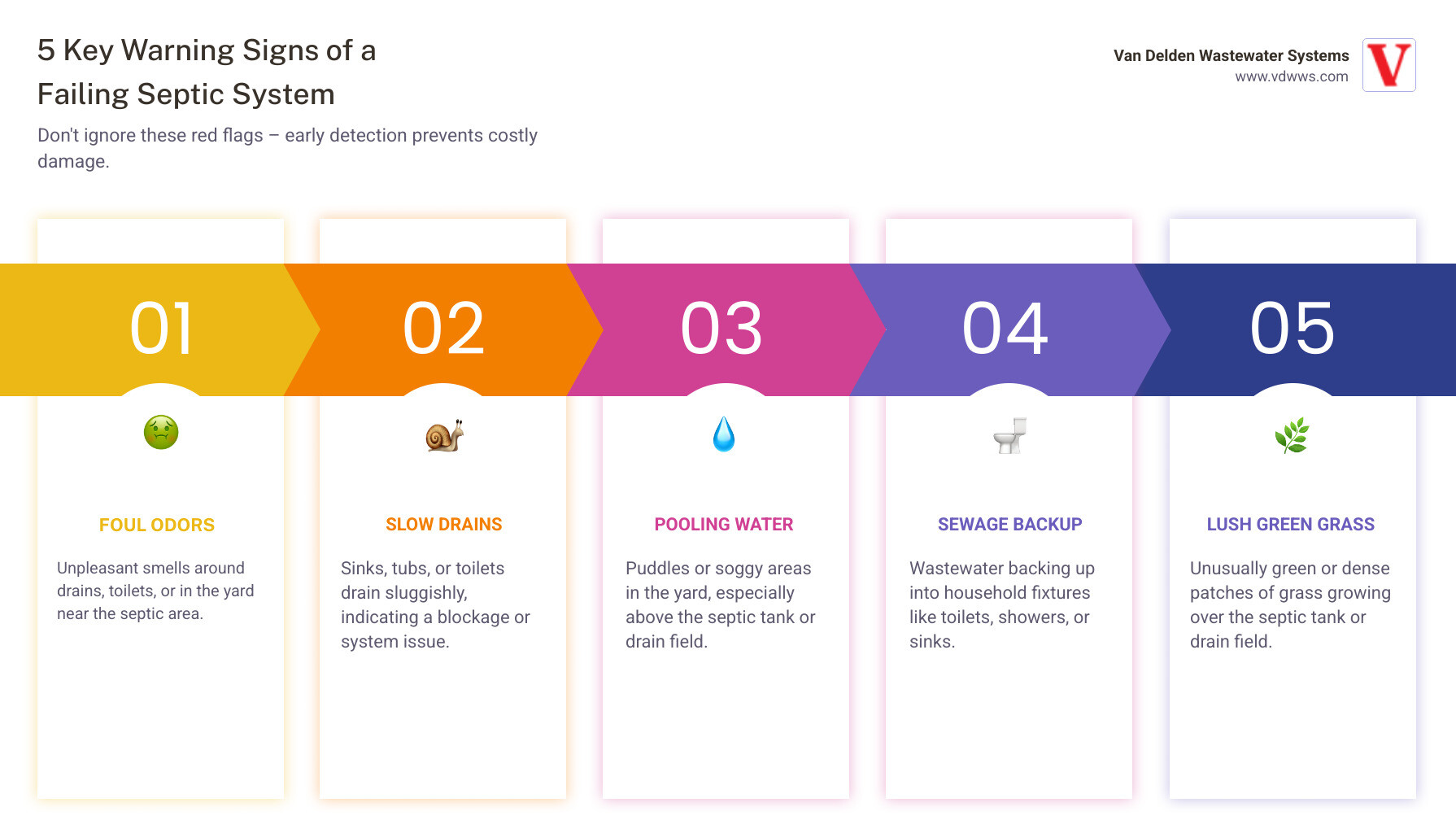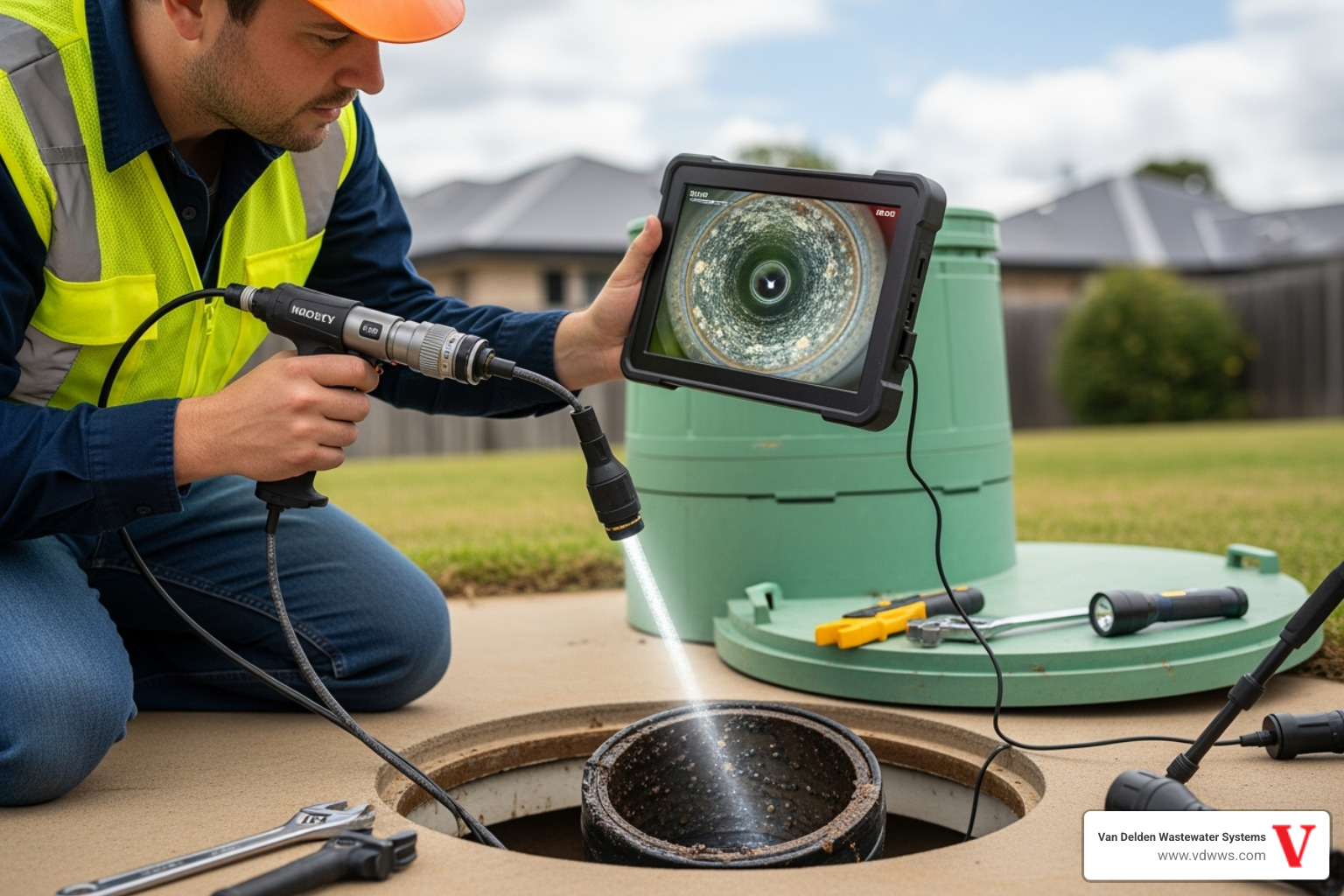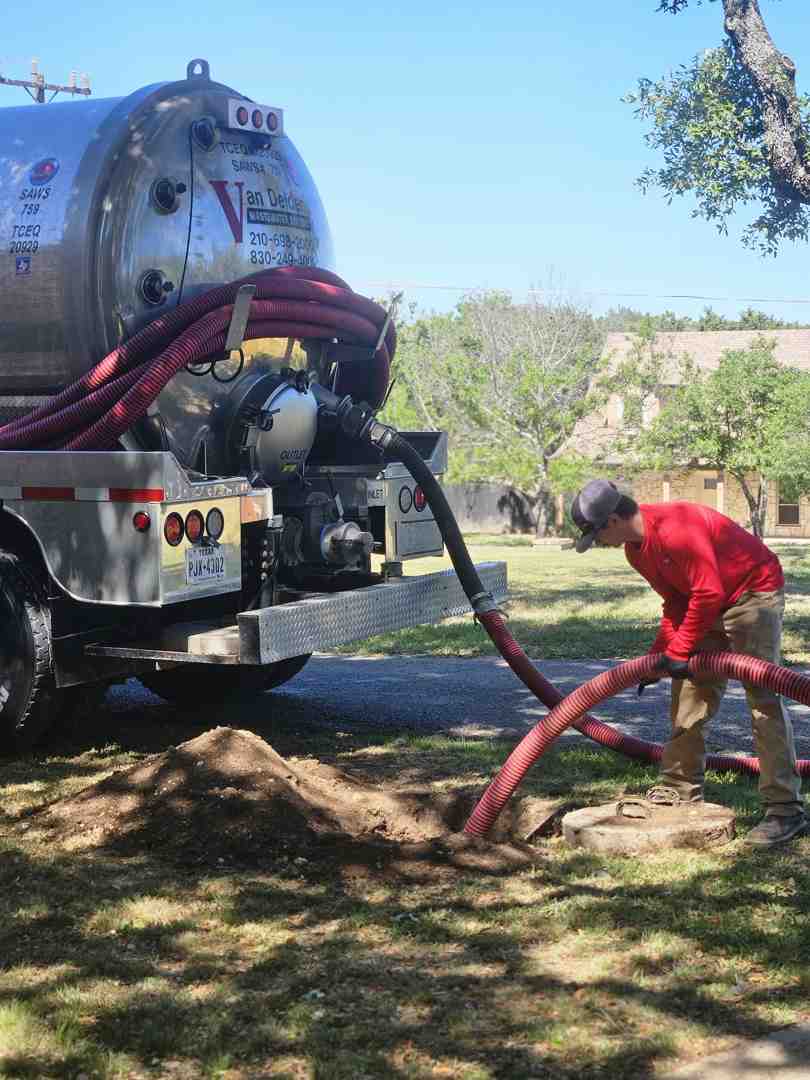Why Professional Septic Inspections Matter for Your Property
A professional septic inspection is a comprehensive evaluation of your entire septic system, from the tank to the drain field. Performed by trained technicians, it identifies potential problems, ensures proper function, and protects your property investment.
What a professional septic inspection includes:
- Tank inspection - checking for cracks, leaks, and structural integrity
- Baffle examination - ensuring inlet and outlet baffles are intact
- Sludge level measurement - determining if pumping is needed
- Drain field assessment - testing soil absorption and checking for backups
- Flow testing - verifying proper wastewater movement through the system
- Written report - detailed findings with photos and recommendations
Your septic system is one of your home's most expensive hidden components, with replacement costs ranging from $15,000 to $30,000. A typical system lasts about 25 years, but without regular inspections, small problems can escalate into costly disasters.
Nearly one in four U.S. households uses a septic system, but many homeowners wait for obvious problems like bad smells or sewage backups before getting an inspection. By then, the damage and repair bills can be enormous.
Whether you're buying, selling, or maintaining your home, a professional inspection provides peace of mind by catching issues early, protecting your family's health, and preventing environmental contamination.

Why a Septic Inspection is a Crucial Investment
A professional septic inspection is one of the smartest investments you can make for your property. While your septic system works tirelessly underground, it needs regular check-ups to prevent major issues.
Catching warning signs early is key. Be alert for foul odors near the septic area, slow drains or gurgling pipes throughout the house, and pooling water or overly lush grass above the drain field. The worst-case scenario is a sewage backup into your home—a costly and hazardous emergency.
Preventing Costly Repairs
A professional septic inspection pays for itself by preventing expensive nightmares. Left unchecked, minor issues like a small crack or clog can lead to total system failure, with replacement costs ranging from $15,000 to $30,000 or more. Regular inspections catch these problems when they are still small and affordable to fix, saving you from catastrophic repair bills.
Health Risks and Environmental Protection
A failing septic system also poses serious health and environmental risks. Raw sewage contains dangerous pathogens that can contaminate groundwater, drinking wells, and your yard, putting your family's health at risk. Environmentally, failing systems pollute local waterways, harming wildlife and ecosystems.
A professional septic inspection ensures your system is functioning safely, protecting both your family and the environment. For more insight, check out The Importance of Septic Inspections When Buying or Selling Property.
How Often Should You Inspect Your System?
Most septic systems should be inspected every 1-3 years, while some can go 3-5 years. The ideal frequency depends on factors like system age (older systems need more frequent checks), household size, and system type. For example, advanced aerobic systems may require annual inspections.
This proactive maintenance not only saves money on repairs but also significantly extends your system's life. A well-maintained system can last for decades. Learn more in our guide: Buying a Home: 3 Reasons to Get the Septic System Inspected.
Benefits of a Professional Septic Inspection for Real Estate
For real estate transactions, a professional septic inspection is essential.
For buyers, it prevents costly post-purchase surprises and provides negotiation leverage. Since septic systems are hidden, an inspection is the only way to assess their true condition. It's also often part of lender requirements.
For sellers, an upfront inspection prevents last-minute deal complications. It allows you to address issues on your own terms, provides proper disclosure to protect you legally, and builds buyer confidence. A clean report can even speed up the sale.
A septic inspection is a small investment that prevents major headaches for both parties. For more guidance, visit: Septic Inspections Buying or Selling Property.
The Anatomy of a Professional Septic Inspection
A professional septic inspection is a thorough, methodical process designed to catch problems early.

The inspection begins with locating system components like the tank and drain field, sometimes using county records. Technicians then access the tank, which may require careful excavation to uncover the access ports. The area is always restored afterward.
Once the tank is open, the core inspection includes:
- A visual tank inspection for cracks, leaks, or corrosion.
- Examining inlet and outlet baffles, which are crucial for preventing solids from reaching the drain field.
- Measuring sludge and scum levels to determine if pumping is needed.
- A water flow test, running water from the house to check for drainage issues.
- Inspecting the pump chamber (for systems with pumps), including the pump, floats, and alarms.
- A drain field evaluation, looking for signs like pooling water or odors. We may use advanced camera equipment to inspect pipes for blockages, root intrusion, or damage.
Every step is documented with photos and notes to give you a complete picture of your system's health. To dive deeper, check out our guide: What Happens During a Septic System Inspection Part I.
What's Included in a Comprehensive Report?
A professional septic inspection concludes with a detailed, easy-to-understand report that serves as your system's health record. It includes:
- A thorough condition assessment of all components.
- Problem identification, explaining any issues found and their likely causes.
- Photo documentation to provide clear visual evidence of our findings.
- A system map showing the layout of components on your property.
- Solutions and maintenance recommendations, including necessary repairs and tips to extend your system's life.
- An assessment of compliance with current codes.
This comprehensive report empowers you to make informed decisions and save money on future repairs. Learn more about the value of this investment: Full Septic System Inspections: $400 Can Save You $30,000.
Do Different Septic Systems Require Different Inspections?
The type of septic system you have determines the specific inspection procedures. While the goal is always to assess function and find problems, the components vary.
- Conventional gravity systems: The most common type. The inspection focuses on the tank, baffles, and drain field absorption.
- Aerobic treatment units (ATUs): These complex systems require detailed checks of the aerator, compressor, control panel, and disinfection unit.
- Mound systems: Used for shallow soil, the inspection focuses on the pump, pressure distribution system, and the mound's integrity.
- Pressure-dosed systems: These require a focus on the pump chamber, pressure lines, and emitters to ensure even distribution.
- Low-pressure pipe and drip irrigation systems: Inspections concentrate on pump function, filters, and emitter performance.
Our technicians are trained to inspect all system types, customizing the approach to each one's unique components and ensuring a comprehensive evaluation.
After the Inspection: Costs, Maintenance, and Choosing an Inspector
After your professional septic inspection, the report becomes your guide for any necessary pumping or repairs. Addressing issues early saves money and prevents system failure.

Between inspections, proper homeowner maintenance is crucial for extending your system's life. Key habits include:
- Water conservation: Fix leaks, take shorter showers, and run full loads of laundry to reduce strain on the system.
- Proper waste disposal: Only flush human waste and toilet paper. Avoid "flushable" wipes, cat litter, feminine hygiene products, and harsh chemicals.
- Using septic-safe products: Choose biodegradable cleaners and avoid excessive use of antibacterial products that harm beneficial bacteria.
- Regular pumping: Most systems need pumping every 3-5 years, depending on tank size and household usage.
These steps will help keep your system healthy. For more on choosing a professional, see our guide: Why You Should Check Credentials When Choosing a Septic Inspector.
Understanding the Cost of an Inspection
The cost of a professional septic inspection varies based on several factors:
- System complexity: A simple gravity system costs less to inspect than a complex aerobic system with pumps and electrical components.
- Tank accessibility: If lids are buried, the required excavation and restoration will add to the labor time and cost.
- Pumping inclusion: Pumping is often included, especially for real estate inspections, and will be reflected in the price.
- Level of detail: A basic visual check costs less than a full diagnostic with camera scoping and a comprehensive report.
- Labor rates: These vary by location and provider experience. The lowest price doesn't always mean the best value. A thorough inspection is an investment in your property's long-term health.
Choosing a Qualified Professional for Your Septic Inspection
Choosing the right professional is critical for an accurate inspection. Look for these qualifications:
- Licensing and certifications: Ensure the inspector is licensed and certified by organizations like the National Association of Wastewater Technicians (NAWT).
- Experience: A long-standing reputation is invaluable. Van Delden Wastewater Systems, for example, has been in business since 1937.
- Comprehensive approach: A true professional performs a multi-point assessment, not just a quick look.
- Detailed reporting: Insist on a clear, written report with photos and actionable recommendations.
- Transparency and honesty: Our technicians are non-commissioned and focused on educating you, not upselling.
- Insurance: Verify the company carries proper insurance to protect you and their workers.
- Reputation and reviews: Check what other homeowners say about their thoroughness and professionalism.
For more guidance, see these resources: Understanding septic system standards and Questions to Ask When Hiring an Inspector for Real Estate Transactions.
Frequently Asked Questions about Septic Inspections
Here are straight answers to the most common questions we encounter about professional septic inspections.
Does a standard home inspection include the septic system?
No, a standard home inspection typically does NOT include a comprehensive septic system evaluation. Home inspectors are generalists who lack the specialized training and equipment to assess underground systems. They might flush a toilet to check drainage, but they won't inspect the tank's interior or evaluate the drain field. If you're buying a home with a septic system, you must hire a qualified septic specialist for a separate professional septic inspection. This crucial step can save you from unexpected and costly repairs.
Is pumping required for every septic inspection?
It depends on the type of inspection.
- For real estate transactions, pumping is almost always required. A full evaluation is impossible without emptying the tank to inspect its interior for cracks, corrosion, or structural damage.
- For routine maintenance inspections, pumping isn't always necessary. If the tank was recently pumped and levels are normal, a full assessment may be possible. However, if high sludge levels are found, pumping will be recommended.
Many homeowners schedule their inspection and pumping together for convenience and cost-effectiveness.
What are the consequences of neglecting a septic inspection?
Neglecting regular professional septic inspections can lead to severe consequences:
- Financial Impact: Minor issues can escalate into complete system failures, with replacement costs from $15,000 to $30,000 or more.
- Health Risks: Failing systems can release untreated sewage containing harmful bacteria and viruses into your yard and groundwater, endangering your family's health.
- Environmental Damage: Contaminated wastewater pollutes local streams, rivers, and lakes, harming wildlife and ecosystems.
- Property Damage and Nuisance: You could face sewage backups in your home, foul odors, and significant property damage.
- Real Estate Complications: A failing system can derail a home sale, lower your property value, and lead to legal issues if problems aren't disclosed.
Regular inspections are an essential insurance policy against these costly and dangerous outcomes.
Conclusion: Protect Your Investment with a Pro Inspection
Your septic system works tirelessly to protect your home and family. As we've shown, a professional septic inspection is not just routine maintenance—it's essential protection against catastrophic repair bills, serious health risks, and environmental damage. It provides peace of mind for homeowners, buyers, and sellers alike.
From understanding the detailed inspection process to knowing what to look for in a qualified professional, you now have a roadmap to a healthy septic system. Don't wait for a problem to arise.
At Van Delden Wastewater Systems, we've provided expert septic services since 1937. Our non-commissioned, background-checked technicians are focused on educating you and providing honest, high-quality work. We ensure you understand your system and how to maintain it for years to come.
Your septic system works hard for you. Return the favor with the professional attention it deserves.
Ready to protect your investment? Let us show you how our comprehensive approach provides confidence in your system's performance: Explore our comprehensive septic system services.
Customer Reviews
Peter was personable, professional and thorough. Highly recommend Van Delden. You might be able to find a cheaper company but not better!
On time. 100% professional, knowledgeable, and courteous. Very helpful and straightforward. That is the bar all businesses should strive for.
It has been a pleasure working with your company. Not only did y’all communicate very well but your workers were always polite! Thank you!
“I thank Van Delden for such prompt service. Honest people are hard to come by these days. I will certainly recommend Van Delden to anyone! Jesse is an upstanding young man and very nice to talk to. I thank everyone at Van Delden for taking such good care of me.”
This is just a note to thank you for explaining the problem with my system. You didn’t have to be so kind and I appreciate your good business ethics and time spent. In the future you will have mine in return!






